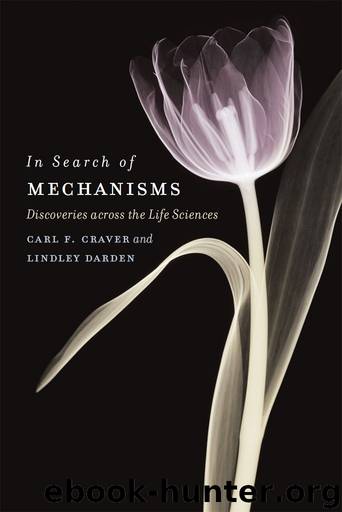In Search of Mechanisms: Discoveries across the Life Sciences by Carl F. Craver & Lindley Darden

Author:Carl F. Craver & Lindley Darden [Craver, Carl F.]
Language: eng
Format: epub
Publisher: University of Chicago Press
8
EXPERIMENTS AND THE SEARCH FOR MECHANISMS
INTRODUCTION
Experiments are indispensable in the search for mechanisms. To experiment on a mechanism, in the sense with which we shall be concerned, is to place one or more parts of the mechanism under the experimenter’s control and to assess from its responses to such interventions how the mechanism must be organized and what its working parts must be. Mechanism schemas express, implicitly, a variety of commitments about the results of such experiments. This is why experimental results can be used to prune and shape the space of possible mechanisms. Different kinds of experiments are used to ask different kinds of questions about how a mechanism works. Our goal in this chapter is to discuss these questions and the experimental strategies used to answer them. We show how these experiments contribute to the construction, evaluation, and revision of mechanism schemas.
Specifically, we discuss three loosely distinct kinds of experiments. The first kind tests whether one entity, property, activity, or organizational feature is causally relevant to another. For example, one might seek the relevant background conditions and triggers for a given phenomenon, or assess whether one putative stage in the mechanism is in fact relevant to what occurs at a later stage. The second kind of experiment, componency experiments, tests whether a given entity, property, activity, or organizational feature is relevant to the behavior of a mechanism as a whole. Such experiments are used to assess relationships between levels in a hierarchically organized mechanism. The third kind of experiment involves patterns of intervention and detection arranged to address particular questions about a mechanism. This third kind of experiment, which encompasses the bulk of the experimental work in mechanistic sciences, is more heterogeneous than the first two. Our goal in this chapter is not to offer a systematic taxonomy of experimental types but rather to call attention to the ways that experiments of the first two sorts are frequently combined, either in a single experiment or across multiple experiments, to answer specific questions about how a mechanism works.
EXPERIMENTS FOR TESTING CAUSAL RELEVANCE
The entities and activities at one stage in a mechanism produce, stimulate, maintain, inhibit, or prevent the entities and activities at another stage. In order to do this, those in the earlier stage must be capable of making a difference to what happens in later stages. Experiments that test for causal relevance test whether a given entity, property, activity, or organizational feature makes a difference to what happens at a later stage in the mechanism.
One can recognize a number of different kinds of difference makers within this broad class. Some difference makers are triggering conditions, conditions that start the mechanism working as a fly’s touch triggers the macabre clamping mechanism in Dionaea muscipula (the Venus flytrap). Some difference makers are background conditions, such as the presence in the trap of a store of fluids in cells and energy gained through photosynthesis. Some difference makers are remote, such as the origins of the clamping mechanism in the species’ evolutionary past or in the development of a particular plant.
Download
This site does not store any files on its server. We only index and link to content provided by other sites. Please contact the content providers to delete copyright contents if any and email us, we'll remove relevant links or contents immediately.
Enlightenment Now: The Case for Reason, Science, Humanism, and Progress by Steven Pinker(7296)
A Journey Through Charms and Defence Against the Dark Arts (Harry Potter: A Journey Through…) by Pottermore Publishing(4795)
The Immortal Life of Henrietta Lacks by Rebecca Skloot(4567)
A Journey Through Divination and Astronomy by Publishing Pottermore(4371)
Elon Musk by Ashlee Vance(4112)
Origin Story: A Big History of Everything by David Christian(3679)
COSMOS by Carl Sagan(3611)
Alchemy and Alchemists by C. J. S. Thompson(3505)
Bad Pharma by Ben Goldacre(3414)
Enlightenment Now by Steven Pinker(3361)
Shadow of Night by Deborah Harkness(3346)
Inferior by Angela Saini(3303)
A Mind For Numbers: How to Excel at Math and Science (Even If You Flunked Algebra) by Barbara Oakley(3289)
Origin Story by David Christian(3189)
The Code Book by Simon Singh(3164)
Signature in the Cell: DNA and the Evidence for Intelligent Design by Stephen C. Meyer(3118)
The Elements by Theodore Gray(3043)
A Brief History of Time by Stephen Hawking(3011)
A Journey Through Potions and Herbology (A Journey Through…) by Pottermore Publishing(2843)
